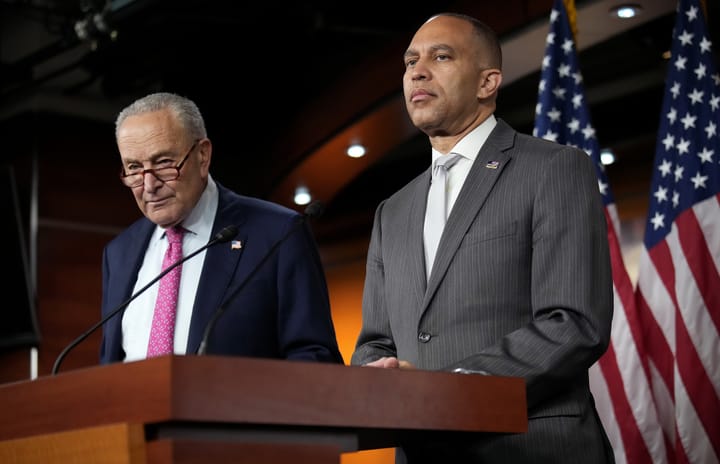Democratic congressional leaders, in their responses to President Trump’s saber-rattling over Iran, are echoing Israeli leaders’ claims that Iran must not be allowed to possess nuclear weapons, even though U.S. intelligence continues to hold that Iran is not building a nuclear weapon and no evidence to the contrary has been presented. The talking points come after the pro-Israel group AIPAC unleashed an enormous wave of spending in the last election cycle to support House and Senate Democrats, and a recent push by AIPAC to pressure House Democrats to release statements copying its messages backing Israel’s war aims.
Shortly after Israel launched unprovoked military strikes on Iran, Senate Minority Leader Chuck Schumer stated on June 13, “I have long said that Israel has a right to defend itself and that Iran cannot have a nuclear weapon. Ensuring they never obtain one must remain a top national security priority.”
While Schumer called for a diplomatic solution, he has not co-sponsored a bill from Sen. Bernie Sanders (I-Vt.) that would bar the Trump administration from using federal funds to attack Iran without congressional approval, even though he signed on to a prior version of the legislation in 2020. Joined by seven Senate Democrats including Sen. Jeff Merkley (Ore.) and Sen. Chris Van Hollen (Md.), the text of Sanders’ No War Against Iran Act states, “Congress has the sole power to declare war under article I, section 8 of the United States Constitution."
A few weeks ago, Schumer took to social media to warn Trump against making any “side deals” with the government of Iran, arguing that Congress should consider any deals struck by Trump’s friend and negotiator Steve Witkoff, special envoy to the Middle East. Peace groups in New York State urged Schumer to remove the post goading Trump, which they wrote was “seeking to out-hawk” the Trump administration’s negotiations with Iran.
House Minority Leader Hakeem Jeffries also put out a statement of support for Israel the day after it began attacking Iran, saying, “Our commitment to Israel’s security is ironclad. Iran is the largest state sponsor of terror in the world and a sworn enemy of the United States and Israel.” It goes on, “There is no circumstance where Iran can be permitted to become a nuclear power.”
Today, Jeffries posted a statement that “Iran is a sworn enemy of the United States” and that “Israel has a right to defend itself against escalating Iranian aggression,” adding that the Trump administration must obtain explicit approval from Congress before engaging in military action against Iran.
Jeffries has not co-sponsored or otherwise called on Congress to pass a resolution like the one led by Rep. Thomas Massie (R-Ky.) and Rep. Ro Khanna (D-Calif.), that would prohibit the military from taking part in hostilities with Iran unless authorized by Congress. The measure, co-sponsored by 14 more House Democrats, seeks to halt the run-up to military escalation with Iran.
Jeffries’ campaign and joint fundraising committee combined received more than $1 million from AIPAC’s PAC last cycle.
The U.S. intelligence community’s 2025 Annual Threat Assessment, released in March, said it continued to assess that Iran is not building a nuclear weapon and the program remains shuttered. Trump withdrew in May 2018 from a landmark international deal overseeing Iran’s nuclear program. In testimony to Congress that month, Tulsi Gabbard, Trump’s director of national intelligence, reiterated the assessment that Iran’s leader Ayatollah Ali Khamenei “has not reauthorized the nuclear weapons program he suspended in 2003, though pressure has probably built on him to do so.”



